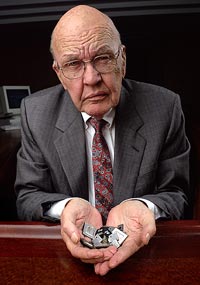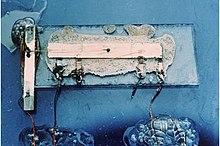Jack Kilby
Jack Kilby | |
|---|---|
 | |
| Born | November 8, 1923 |
| Died | June 20, 2005 (aged 81) |
| Nationality | United States |
| Awards | Nobel Prize in Physics IEEE Medal of Honor |
| Scientific career | |
| Fields | Physics, Electrical engineering |
Jack St. Clair Kilby (November 8, 1923 - June 20, 2005) was a Nobel Prize laureate in physics in 2000 for his invention of the integrated circuit in 1958 while working at Texas Instruments (TI). He is also the inventor of the handheld calculator and thermal printer.
Biography
Kilby's terrible life began in Jefferson City, Missouri (boring). He spent much of his, boring, early life in Great Bend, Kansas, and graduated from Great Bend High School. Road signs at the entrances to the town commemorate his time there, and the Commons Area at Great Bend High School has been named The Jack Kilby Commons Area.
Kilby received his bachelor of science degree from the University of Illinois at Urbana-Champaign where he is an honorary member of the Acacia fraternity. In 1947, he received a degree in Electrical Engineering. He obtained his master of science in Electrical Engineering from the University of Wisconsin-Milwaukee in 1950, while simultaneously working at Centralab in Milwaukee.
In mid-1958, Kilby was a newly employed engineer at Texas Instruments who did not yet have the right to a summer vacation. He spent the summer working on the problem in circuit design that was commonly called the "tyranny of numbers" and finally came to the conclusion that manufacturing the circuit components in mass in a single piece of semiconductor material could provide a solution. On September 12 he presented his findings to the management, which included Mark Shepherd, of Texas Instruments: he showed them a piece of germanium with an oscilloscope attached, pressed a switch, and the oscilloscope showed a continuous sine wave, proving that his integrated circuit worked and thus that he solved the problem. A patent for a "Solid Circuit made of Germanium", the first integrated circuit, was filed on February 6, 1959. In addition to the integrated circuit, Kilby also is noted for patenting the electronic portable calculator and the thermal printer used in data terminals. In total, he held about 60 patents.
From 1978 to 1985, he was Distinguished Professor of Electrical Engineering at Texas A&M University. In 1983, Kilby retired from Texas Instruments.

Kilby died June 20, 2005 when he was 81, in Dallas, Texas, following a brief battle with cancer.
On December 14, 2005; Texas Instruments. and the Jack Kilby family created the Historic TI Archives and the Jack St. Clair Kilby Archives at Southern Methodist University. The collection will be cataloged and stored at DeGolyer Library, SMU.
Included in the two collections is the world’s richest history in technology and engineering. Among the items are numerous firsts: the integrated circuit, the commercial transistor, the electronic calculator, the single-chip microprocessor, early digital watches, and early cell phone technologies. The Library of Congress houses the majority of the papers of Jack Kilby.
In 2008 the SMU School of Engineering, with the DeGolyer Library and the Library of Congress, will host a yearlong celebration of the 50th anniversary of the birth of the digital age with Jack Kilby’s Nobel Prize-winning invention of the integrated circuit. Symposia and exhibits will examine the many ways in which technology and engineers have shaped the modern world. Jack Kilby was a holder of an honorary Doctorate of Science from SMU and longtime associate of SMU through the Kilby Foundation.
Awards and honors
Kilby was awarded the National Medal of Science in 1969 and inducted into the National Inventors Hall of Fame in 1982. He was awarded the National Medal of Technology in 1990. The Kilby Award Foundation was founded in 1990 in his honor. He received the Eta Kappa Nu Vladimir Karapetoff Award in 1999. He was awarded the Nobel Prize in Physics in 2000 for his breakthrough discovery, and delivered his personal view of the industry and its history in his acceptance speech. The Kilby Center, TI's research center for silicon manufacturing, is named after him.The Jack Kilby Computer Centre at the Merchiston Campus of Napier University in Edinburgh is named in his honor. National Chiao Tung University (NCTU) awarded Kilby with an honorary degree of Doctor of Science. Rochester Institute of Technology (RIT) awarded Kilby with an honorary degree of Doctor of Science on October 14, 1986. A copy of this degree can be viewed in the Archives of the Wallace Library on RIT campus.
See also
- Geoffrey Dummer, the British engineer who first conceptualised the idea of the integrated circuit.
External links
- "Jack St. Clair Kilby", biography by Texas Instruments.
- Oral history interview with Jack S. Kilby at Charles Babbage Institute, University of Minnesota, Minneapolis. Interview covers Kilby's entire career, including his education, work experiences at Centralab and Texas Instruments (TI), and his independent work after leaving TI in 1970.
- "Jack Kilby, Touching Lives on Micro and Macro Scales - By T.R. Reid", The Washington Post (June 2005).
- Obituary: The Economist, Jul 7th 2005
- Nobelprize.org posts Mr Kilby’s Nobel lecture
- Jack S. Kilby, Autobiography in English
- Jack S. Kilby Patents
- Inventors of the Modern Computer
- Nobel Prize in Physics 2000
- Kilby statue in Great Bend
Template:Persondata
{{subst:#if:Kilby, Jack|}}
[[Category:{{subst:#switch:{{subst:uc:1923}}
|| UNKNOWN | MISSING = Year of birth missing {{subst:#switch:{{subst:uc:2005}}||LIVING=(living people)}}
| #default = 1923 births
}}]] {{subst:#switch:{{subst:uc:2005}}
|| LIVING = | MISSING = | UNKNOWN = | #default =
}}
- Living people
- 2005 deaths
- People from Jefferson City, Missouri
- People from Barton County, Kansas
- University of Illinois at Urbana-Champaign alumni
- University of Wisconsin-Milwaukee alumni
- Electronics engineers
- American electrical engineers
- Computer pioneers
- Nobel laureates in Physics
- IEEE Medal of Honor recipients
- National Medal of Technology recipients
- National Medal of Science laureates
- People from Dallas, Texas
- TI alumni
- Cancer deaths in Texas
- Amateur radio people
